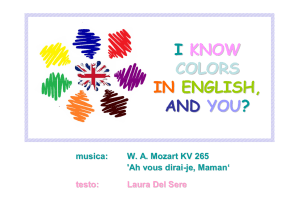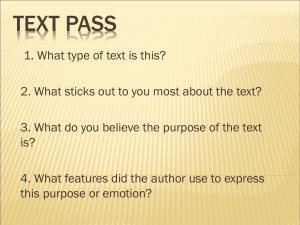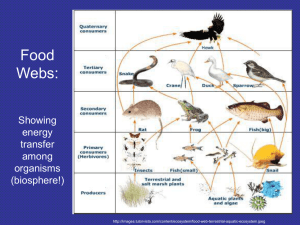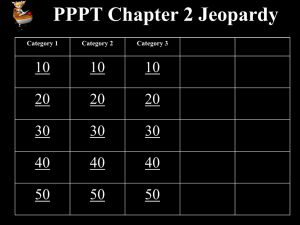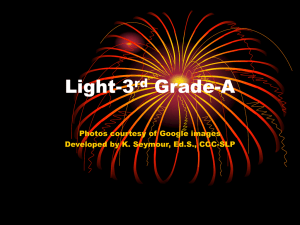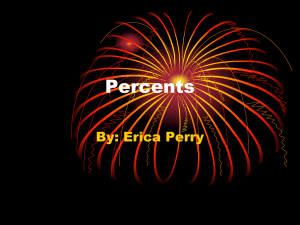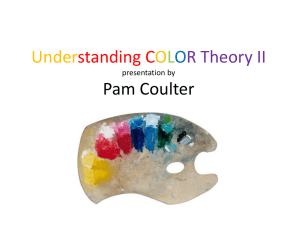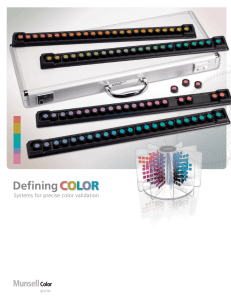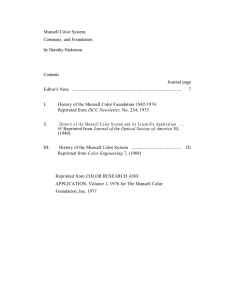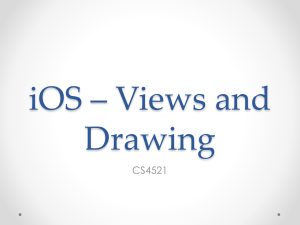Modern Color Theory-3
advertisement
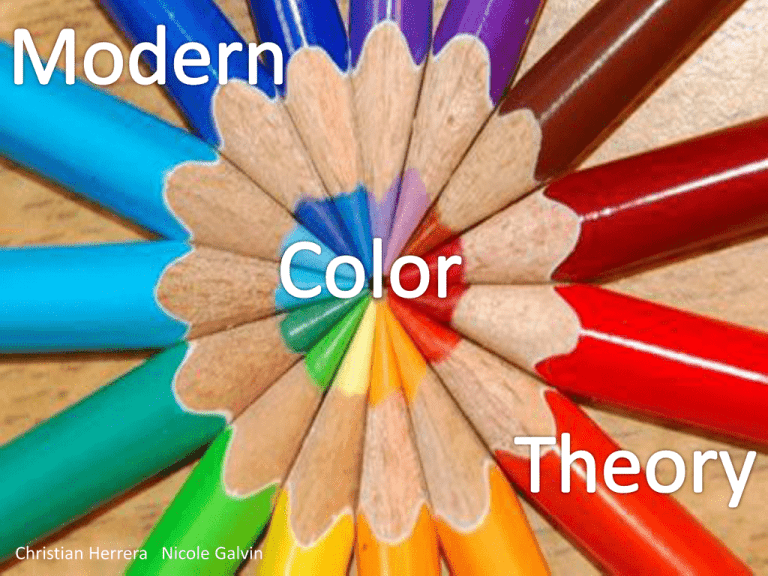
Christian Herrera Nicole Galvin http://munsell.com/wp-content/uploads/2013/05/Munsell_Blog_AlbertMunsell.jpg http://www.google.com/url?sa=i&source=images&cd=&docid=d1tW1h0m9W_IxM&tbnid=F8WSkD0T8ZNI1M:&ved=0CAgQjRw&url=http%3A%2F%2Fwww.huevaluechroma.com%2F&ei=adoHU6cPybzIAbf_gbA N&psig=AFQjCNHfh96HlATPt4VQqp2MP9jktzNMnQ&ust=1393109993132034 “Desire to fit a chosen contour, such as the pyramid, cone, cylinder or cube, coupled with a lack of proper test, has led to many distorted statements of color relations, & it becomes evident, when physical measurement of pigment values & chromas is studied, that no regular contour will serve.” – Albert H. Munsell, A Pigment Color System & Notation Hue – measured around horizontal circles Chroma – measured radially outward from the vertical axis Value – measured vertically http://www.google.com/url?sa=i&source=images&cd=&docid=EFhcq47XKqfpgM&tbnid=r9HEy2N4K1nOM:&ved=0CAgQjRw&url=http%3A%2F%2Fvickiwelsh.typepad.com%2Ffield_trips_in_fiber%2F2012%2F03%2Fcolor-theory-4-the-colortheorists.html&ei=ZtoHU_zbK8fyyAHOhYGICA&psig=AFQjCNFCD4uz8-IEb7zubW9DdZtQN-kmPw&ust=1393109990775297 http://en.wikipedia.org/wiki/File:Munsell_1929_color_solid_transparent.png http://www.google.com/url?sa=i&source=images&cd=&docid=P7rPwswQk7Wu3M&tbnid=v3q1Bo6j1HZRqM:&ved=0CAgQjRw&url=http%3A%2F%2Fwww.handprint.com%2FHP%2FWCL%2Fcolor18a.html&ei=Z9oHU_yXOubbyQHv3oDoAw&psig=AFQjCNEX6tMpvqCoEPdar8HE Eg9G0ck5cw&ust=1393109992049764 http://en.wikipedia.org/wiki/File:Munsell_1929_color_solid_transparent.png http://en.wikipedia.org/wiki/Munsell_color_system Example of Munsell’s System A Light Yellow Hue with a Dark Color Mixed In = 5Y 8/12 Pure yellow (5Y) of light hue (8) with a hint of the complimentary color purple (identified by its value in the mix as 12) Johannes Itten Color Contrasts http://achtnullvier.com/sites/default/files/glossar/johannes_Itten.jpg?1320933188 Contrasts of Hue The interaction of two or more different colors http://myweb.wssu.edu/betzs/primary25a.jpg Light-Dark Contrast Contrast between light values & dark values Simultaneous Contrast Contrast of Extension (Proportion) http://abstractartist.org/wp-content/uploads/2011/04/josef-albers-portrait.jpg http://3.bp.blogspot.com/-OnKhbZhcslc/Ug_QVMCGkZI/AAAAAAAACbk/uhchk39nJE8/s1600/albers.png http://25.media.tumblr.com/tumblr_m14ujsPK8W1ro4yjro1_500.jpg Equiluminance http://visualizeit.files.wordpress.com/2008/10/siggraph.png Partitive Color Mixing https://fbcdn-sphotos-c-a.akamaihd.net/hphotos-ak-ash3/t1/1506813_10151907761701487_2089181029_n.jpg Simultaneous Contrast One Color Appears as Two http://1.bp.blogspot.com/-j3Lf4wu0B7I/UDAdOtQ-_TI/AAAAAAAARFw/1rtadC1fb8g/s1600/mental8-6b.png Simultaneous Contrast Two Colors Appear as One http://www.uxmatters.com/mt/archives/2006/01/images/color-theory-images/SuccessiveContrast2-1.gif Color Models Mixing Subtractive RYB color http://www.practicalecommerce.com/files/images/0004/1533/rgb_cmyk.png Color Receptors RED GREEN BLUE RGB http://thehumaneyeandthecamera.blogspot.com/p/difference-between-rods-and-cones.html Secondary Light Colors • Green + Blue = Cyan • • • • Blue + Red = Magenta Red +Green = Yellow (CMY) Red + Green + Blue = White http://dba.med.sc.edu/price/irf/Adobe_tg/models/images/rgb_model.gif RGB Color Experience http://api.ning.com/files/yltp4bQ88zstEUnSSyz1SuRrCsGJHfI55QCww*6io1Xj5Bdu45-xun2cxhQ3cosTO0ryEQRGdw17tfp7nWRrgQ__/TV.jpg Reflected Colors SUBTRACTIVE MIXING Printers Primary Colors CMY Subtractive Mixing http://dba.med.sc.edu/price/irf/Adobe_tg/models/images/cmy_model.gif http://www.math.harvard.edu/computing/latex/color_files/rgbcmyk.gif http://rip94550.files.wordpress.com/2009/03/picture-32f.png?w=780 The Mix Primary Color system in art classes. http://upload.wikimedia.org/wikipedia/commons/5/55/Color_star-en.svg RYB = Duller Color RYB (Subtractive) CMY (Subtractive) RGB (Additive) https://lh3.googleusercontent.com/-rhucl_2K1jY/TWqXTwYRdjI/AAAAAAAAHZ4/tmz6L6uGmT0/s1600/farbsub.jpg Color Harmony http://hallgroat.com/wp-content/uploads/2013/06/MONOCHROMATIC-COLOR-HARMONY.jpg Complementary Colors at opposite ends of the color wheel. Creates a visual vibration. Ex. Green and Red. http://www.tigercolor.com/Images/Swatch_rect.gif Split Complimentary Color scheme that uses two adjacent colors and their compliment. There is a visual contrast as the Complimentary scheme but its easier on the eyes. Ex. Green, purple, and orange, http://www.tigercolor.com/Images/Swatch_rect.gif Double Complimentary Double complimentary uses four colors, these are two pairs of complimentary colors. Complimentary colors intensify each other; this would make some colors combinations easier to look at than others. Ex. Red, Orange. Green, and Blue. http://www.tigercolor.com/Images/Swatch_rect.gif Analogous An analogous color scheme uses colors which are next to each other on the color wheel. This color scheme is usually the most pleasing to the human eyes, since the colors carry similar wavelengths. Ex. Cool colors, Light-Blue, green, and light-green http://www.tigercolor.com/Images/Swatch_rect.gif Triadic A combination of three colors on the color wheel which are evenly spaced on the color wheel. This scheme tends to be pretty vibrant regardless of combination of colors. Ex. Purple, Orange, and green. http://www.tigercolor.com/Images/Swatch_rect.gif Square This scheme consists of four color evenly spaced of the color wheel. Ex. Red, blue, green, and yellow. http://www.tigercolor.com/Images/Swatch_rect.gif Monochromatic http://upload.wikimedia.org/wikipedia/commons/thumb/1/1a/CPT-Websites-monochrome.svg/201px-CPT-Websites-monochrome.svg.png. Bibliography Albers, Josef, and Nicholas Fox Weber. Josef Albers: A Retrospective. New York: Solomon R. Guggenheim Foundation, 1988. Print. "Color." Roeger. N.p., n.d. Web. 22 Feb. 2014. <http://www.roeger.tv/color/>. Fraser, Tom, and Adam Banks. Designers Color Manual. San Francisco: Chronicle, 2004. Digital file. "Itten, Johannes (1888-1967)." The Thames & Hudson Dictionary of Design Since 1900. London: Thames & Hudson, 2004. Nielson, Karla J., and David A. Taylor. Interiors an Introduction. 3rd ed. New York: McGraw-Hill, 2002. Print. Rosenthal, T. G., and Josef Albers. Josef Albers: Formulation : Articulation. New ed. New York: Thames & Hudson, 2006. Print. Siebenbrodt, Michael, and Elisabeth Reissinger. Bauhaus Weimar: Designs for the Future. Ostfildern-Ruit: Hatje Cantz, 2000. Print. Stone, Terry Lee, Sean Adams, and Noreen Morioka. Color Design Workbook: A Real-world Guide to Using Color in Graphic Design. Gloucester: Rockport, 2006. Print. *Images cited on slides*
